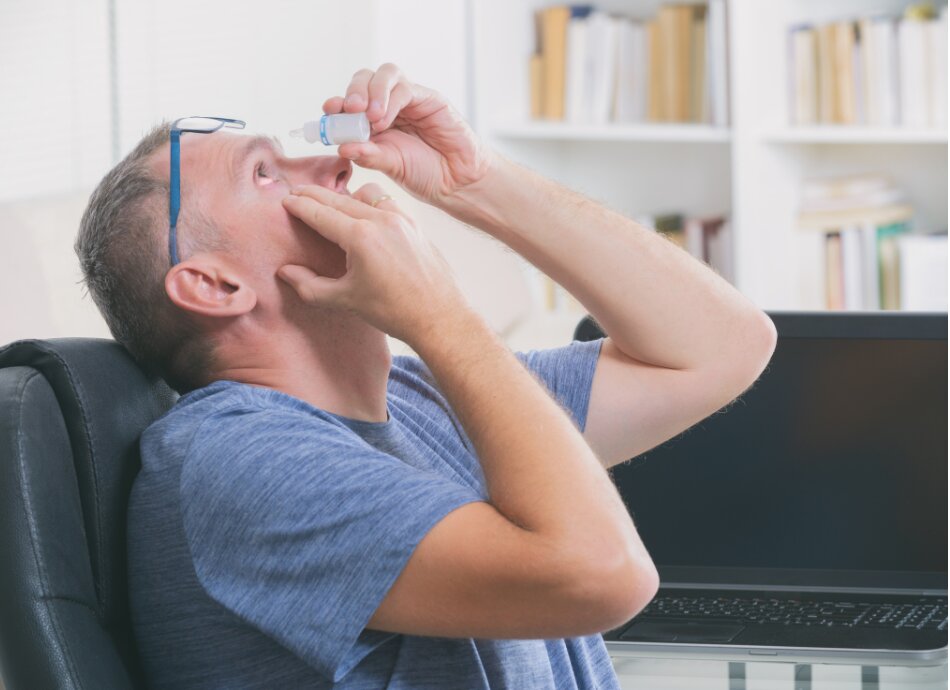Entropion
Key points about entropion
- Entropion is a condition where your eyelid folds in towards your eye. This causes your eyelashes to rub against your eye causing irritation.
- The eye irritation can damage your cornea (the front of your eye), and in some cases cause visual impairment.
- Symptoms include watery eyes, crusting of the eyelid, leakage of eye mucus and a feeling that something is in your eye.
- Treatment ranges from eye drops to surgery.
- There are self-care steps you can take to reduce irritation in your eye when you have entropion.

Entropion is a condition where your eyelid folds in towards your eye. This causes your eyelashes and eyelid skin to rub against your eye and this can damage your cornea (the front of your eye) and for some people it can cause visual impairment.
The image below shows entropion and ectropion, another eye condition where your lower eyelid sags and turns outwards away from your eye.

Image credit: Depositphotos
Entropion can occur in 1 or both eyes and it’s most often seen in your lower eyelid. Entropion is common in adults over the age of 60 as your eyelid muscles weaken with age, but some people are born with it.
It’s important to treat entropion to prevent eye damage and vision loss.
Entropion can be present at birth (congenital) or you may develop it later as a result of:
- ageing
- scarring of your eyelid from burns, injury or surgery
- trachoma infection (a bacterial eye infection).
The main symptoms of entropion are:
- watery eyes
- red eyes
- eye pain
- crusting of your eyelid
- leakage of eye mucus
- irritation of your cornea (the front of your eye)
- problems with your vision
- feeling that something is in your eye
- sensitivity to light and wind.
See a doctor immediately if you have any of these:
- Blurred vision.
- Loss of side vision.
- Sensitivity to light.
- Seeing coloured halos.
- Increasing redness of your eye.
- Pain in your eye.
- Nausea (feeling sick) or vomiting (being sick).
If you think you might have entropion, it’s important to see your healthcare provider or optometrist for an eye examination. They can detect eye diseases and assess what may be causing your symptoms. You will then be referred to an eye specialist (ophthalmologist) for further treatment if necessary. No special tests are needed most of the time.
Let your healthcare provider know if you’ve recently been to an area where trachoma infection (a bacterial eye infection) is common, such as developing countries in Africa, Asia, Latin America, the Middle East and the Pacific Islands.
If you have dry eyes or mild symptoms, use an eye lubricant such as artificial tears, to keep your eyes moist. If your entropion is more severe, surgery is usually recommended to tighten your eyelids to prevent eye irritation and vision loss.
Some eye care specialists may recommend soft contact lenses to protect your eyes from irritation, or botulinum toxin (Botox) injections if surgery isn’t an option. Other temporary treatments include using stitches or special transparent skin tape to stop your eyelid folding inwards.
See your healthcare provider if your eyes become more and more red or painful, or your sight becomes blurred. You may need antibiotic or steroid eye drops.
Surgery
The surgery for treatment of entropion is called eyelid surgery (blepharoplasty) and it’s usually done under local anaesthesia while you’re awake. Your eye surgeon or ophthalmologist will be able to recommend the best procedure for you.
If you think you might have entropion, start using artificial tears and eye lubricating ointments to protect your eye even before you see your healthcare provider. You can also use these treatments if you’re waiting for surgery for your entropion.
Your healthcare provider may also give you some special transparent tape that you can use to stop your eyelid from turning in until you have your surgery.
While your eyes are irritated, avoid using eye makeup such as eyeshadow, eyeliner and other cosmetics around the eye. Also avoid using contact lenses until your symptoms are under control.
Regular eye checks are important
As you get older, you should get your eyes checked regularly. Also get your eyes checked straight away if you notice any changes or you think your vision is not as clear as it used to be.
Eye protection
Wear sunglasses to reduce glare and UV damage.
Most people with entropion do well if it’s treated before eye damage occurs.
If it’s not treated, entropion can increase the risk of damage to your cornea, eye infections and loss of vision.
References
- Entropion(external link) MedlinePlus, US, 2022
- Entropion(external link) Mayo Clinic, US, 2021
- Entropion(external link) Cleveland Clinic, US, 2022
Credits: Healthify editorial team. Healthify is brought to you by health Navigator Charitable Trust.
Reviewed by: Karen Moulton, Optometrist, Bay of Plenty
Last reviewed:





